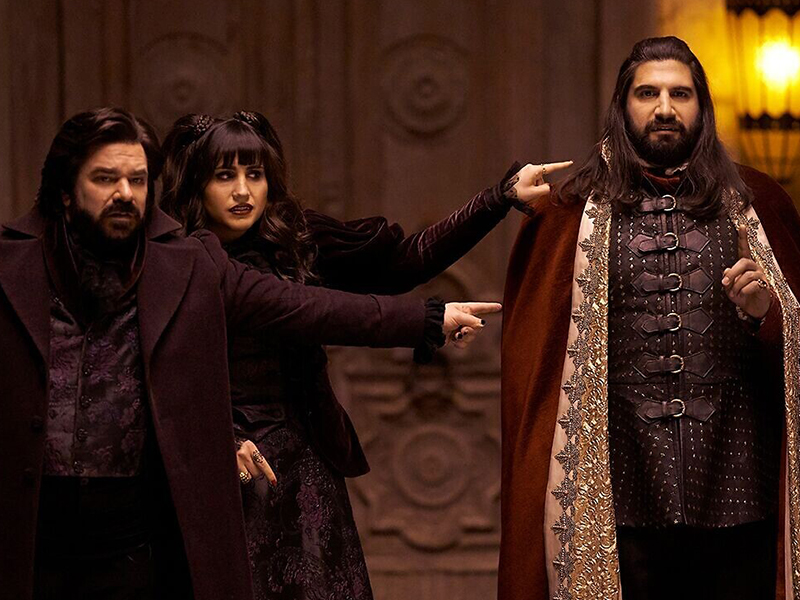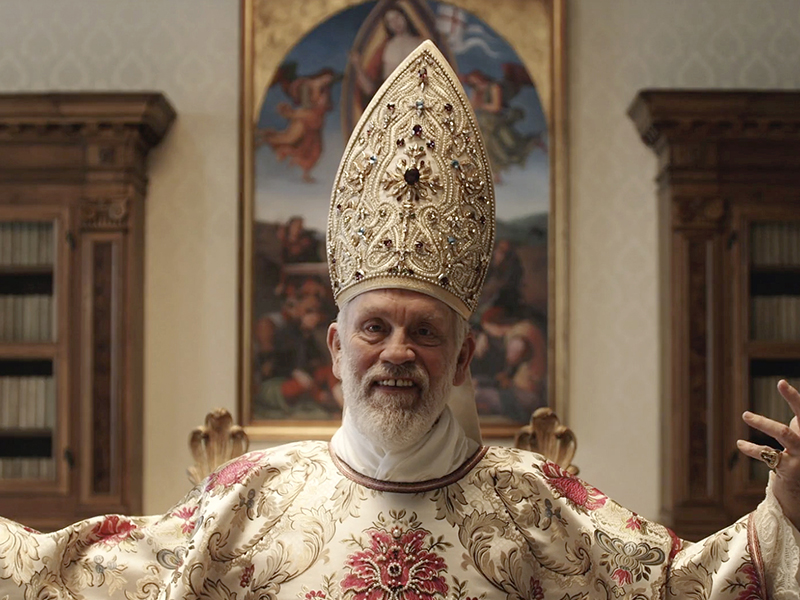5 series to watch at home
I’ve put together a list of series that can be watched (by binging or with moderation) on HBO GO, trying not to go for the very popular options or follow a certain theme – they address topics such as the human way to cope with death/disappearance of the loved ones, Demiurge, power struggles inside the Vatican, a makeover of series with psychopaths and detectives, a bunch of ridiculous vampires and their attempt to integrate into the contemporary world. How you want to watch them is, of course, your choice.

Devs resumes some of Alex Garland’s obsessive themes (Ex Machina, Annihilation): the evil Demiurge, the idea of controlled reality, evil doppelgangers, and so on. Here, Garland designs a universe in which, due to a machine built on hyper-complex algorithms, each and every moment in human life (past or future) can be predicted and watched on screen. In a thick forest, where oversized statues of little girls, with their mouths open and their eyes wide, mimick a gesture or a handshake, the founder of Devs (a top-secret organization sponsored by the American government) is actually trying to see again his daughter he lost in a car accident. There are images like an audiovisual sarcophagus (the innocent video of his daughter blowing in soap bubbles which plays in a loop in the dark room of the lab seems to give a different meaning to “the mummy complex” that Bazin was talking about). Other times, almost unreal, he watches the crucifixion of Jesus.However, apart from this fantastic theme, the film is about a Russian spy who is killed once he enters the lab – and the efforts of his girlfriend in going against the scientists at Devs. But after countless failed attempts, she begins to understand that she herself is part of the Devs system – and that her actions are controlled and manipulated.

In line with Devs‘ main idea, The Leftovers explores the mourning process and how people gradually accept that their loved ones have disappeared. One day, more than half of the planet’s population witnessed a supernatural cataclysm – people shopping and carrying their baskets, having breakfast with their families or sleeping, have vanished out of the blue. There is nothing left in their place – a complete blur, as if the person in question never existed. As a result, religious or anti-religious groups appear over the night (a number of people dressed in white who refuse to speak, just walk the streets and remind the living that they have nothing to live for). The complex, surreal narrative structure, which covers many characters and their lives post and pre-cataclysm, makes it one of the most valuable series I’ve ever watched – and, without fail, in the end it answers the question “where did everyone else go?”.

Probably the most accessible and lightest series on the list is Killing Eve – a spinning cat-and-mouse chase between two women – Eve, a detective bored with office life, and Villanelle, a very skilled serial killer. Down the line, the two end up constantly searching for each other, but not on behalf of the law, rather out of a kind of erotic fascination. From the very start, Killing Eve seems to have a feminist twist on the psychopath stereotype: the assassin is a very chic, ostentatious and obsessive woman, who kills for pleasure. However, she’s not a misandry-based heroine – she’s not the male counterpart of the psychopath (she hasn’t been put under a masculine light, and doesn’t have the strength of a brute or wishes to take revenge on anyone), but she exhibits her femininity in order to slip through more easily. She is different from the protagonist of Revenge (who carries a personal vendetta on the men who harassed and humiliated her). Villanelle kills women and men alike; the lack of any real weakness makes her extremely unpredictable – sometimes she makes it look like she has fallen apart, and then easily gets over it. I only recommend watching the first season; the second and the third one (the first few episodes that have just appeared on HBO) are repetitive and far less interesting to keep watching to the very end.

For the connoisseurs, What We Do in The Shadows designates, first of all, the film directed by Jemaine Clement and Taika Waititi (Jojo Rabbit, 2019) – a mockumentary about some vampires who live their immortality together, in a modern mansion. The overall picture is kept in the homonymous series, although the plot and characters are quite different (for example, among the vampires there are also an energetic vampire, Colin Robinson, and a butler, Guillermo). Among the vampire movies, What We Do in The Shadows is a very hybrid product: it’s infused with gothic pop culture (without being Addams’ Family, but keeping a lot of the genre’s comic-cynical jokes), and meta inserts (the actual crew of the series is included in several gags – for example, one of the vampires accidentally kills a sound guy; Tilda Swinton also appears, copying her eponymous character from Only Lovers Left Alive). The main plot of the first season revolves around the visit of a vampire count, who wants the expansion of vampires over the world (and so he wants to start with the USA). The protagonists, however, shy and inexperienced, make infinite bureaucratic efforts and only succeed in conquering the street on which they live. They encounter obstacles on every corner – for example, the energetic vampire they avoid, even though they live in the same house (a day walker, unlike them, the only vampire who can suck the energy of another vampire), finds his nemesis in a co-worker, an emotional vampire (in other words, she feeds on people’s pity). Their preoccupations include DIY activities (one of them recreates by scissors, in a labyrinth garden, the vulvae of the women in his life), or searching for the humanoids they loved in another life and are currently reincarnated.

The New Pope is the sequel of The Young Pope, a hyper-fictionalized version of the Vatican, with an American pope addicted to Cherry Coke, among others. Sorrentino’s style (over the top, extravagant and exuberant) is imprinted here too – by infusing this Fellini-rooted universe (the cosmopolitan-glossy à La Dolce Vita Italy + the Catholic Italy, prude to the bone) with divine miracles. Although the Church should serve the divinity, it’s rather concerned with personal ordinary matters: either finding the position in a comfortable chair, or the safekeeping of a homosexual relationship between priests, and so on. Basically, The New Pope (& The Young Pope at the same time) practices deception – nothing is faultless in these people (the priests are flesh and bones, the preservation of their carnal world is above the spiritual). Actually, The New Pope is about the invisible struggle between leaders – the former pope, Lenny Belardo (Jude Law), who is in a coma in a Venetian hospital, and idolized to fanaticism (the local radio broadcasts his breathing 24/24), and the new pope (John Malkovich), a solitary and childish exuberant (for example, like any eager child, he uses the new status to invite his idols to the Vatican, Marilyn Manson and Sharon Stone). Like any substitute, the new pope must fight the chimeras of the past, adjust to the needs / moping of his disciples, but also understand the role of the Vatican in an unprecedented political struggle.
Journalist and film critic, with a master's degree in film critics. Collaborates with Scena9, Acoperișul de Sticlă, FILM and FILM Menu magazines. For Films in Frame, she brings the monthly top of films and writes the monthly editorial Panorama, published on a Thursday. In her spare time, she retires in the woods where she pictures other possible lives and flying foxes.


